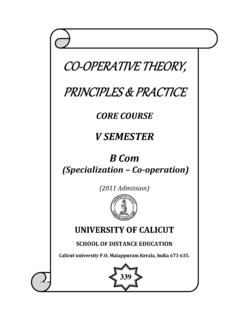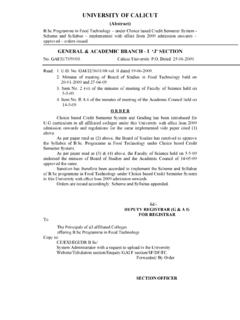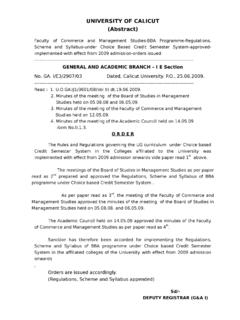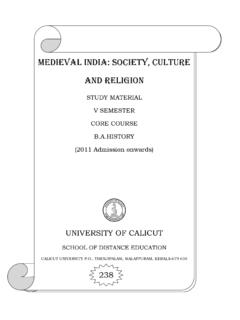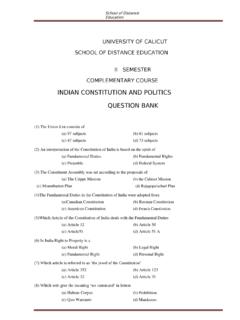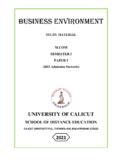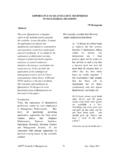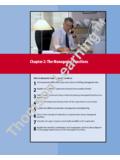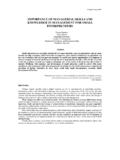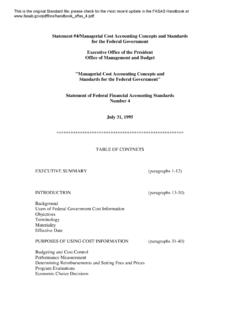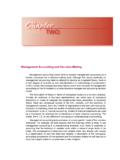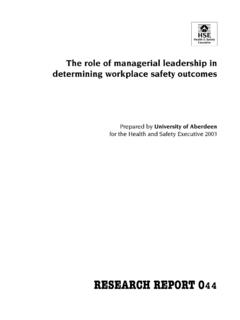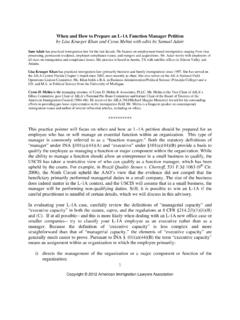Transcription of ACCOUNTING FOR MANAGERIAL DECISIONS - University of …
1 ACCOUNTING FOR MANAGERIALDECISIONSMASTER OF COMMERCES emester IPaper IIISTUDY MATERIAL2015 AdmissiononwardsUNIVERSITY OF CALICUTSCHOOL OF DISTANCE EDUCATIONCALICUT University , THENJIPALAM, MALAPPURAM-6736352023 School Of Distance EducationAccounting for MANAGERIAL DecisionsPage2 University OF CALICUTSCHOOL OF DISTANCE IPaperIIIS tudy material2015 AdmissiononwardsACCOUNTING FOR MANAGERIAL DECISIONSP repared byDr. Basheer AhammedAssociate Professor (Retd.)Head, DCMS,SAFI Institute ofAdvanced StudyVazhayoorScrutinised by:Dr. Yakoob . and Research Guide,SS COLLEGE, settings and Lay out :Computer Section, SDE ReservedSchool Of Distance EducationAccounting for MANAGERIAL DecisionsPage3 SYLLABUSMC1C3 ACCOUNTING FOR MANAGERIAL DECISIONSO bjective:Enable the students to know the applications of ACCOUNTING tools, techniques andconcepts in MANAGERIAL decision making 1 :Management ACCOUNTING : Nature, Scope and functions-Role of ManagementAccountant-Cost Concepts and Classification-Variable Costing and Absorption Costing-Emerging Costing Approaches Life cycle costing-Quality costing-Kaizen costing-Throughputcosting-Back flush costing-Activity Based Costing-Introduction-Concepts-Cost drivers and costpools-steps to develop ABC System-ABC System and Corporate.
2 Capital Investment Process-Investment Appraisal Methods-Paybackperiod-ARR-Time adjusted methods-Discountedpaybackperiod-Net Present Value method-IRR-PI-TVmethod-Capital Rationing-Risk Analysis- decision Tree approach-Sensitivity Analysis-Otherstatistical 3 : CVP Analysis and decision Making: MANAGERIAL application of CVP analysis-Makeor Buy decision -Alternative Methods of production-Buy or Lease decision -Shut down orcontinue-Repair or replace-Accepting bulk orders for idle capacity utilization-Pricing underdifferent situation-Suitable product mix-Key factor 4 : Cost of Capital : Concept-Relevance-Elements of cost of capital-Cost of Equity-Cost of Debt-Cost of Retained Earnings-Calculation of Weighted Average Cost of Capital-Costcontrol and cost reduction techniques-Value 5 : Performance Measurement : Financial and Non-financial Measurement-Performance-Return on Investment-Residual Income-EVA-Concept-Measurement-Balanced Score Card-Concept-Objectives-Multiple Score Card measures-New horizons in MANAGERIAL Control-Transfer Pricing-Responsibility ACCOUNTING -Performance Budgeting-ZBB-Social Cost BenefitAnalysis.
3 ( Theory : 40% and Problems : 60% )Books for and Management ACCOUNTING -by SP Jain and KL Narang. (Kalyani) ACCOUNTING and Financial control-by SN Maheswari.(Sulthanchand and Sons) Management ACCOUNTING -by Ravi M Kishore. (Taxman)School Of Distance EducationAccounting for MANAGERIAL DecisionsPage4 INDEXUNITP articularsPage CONCEPTS AND COSTING INVESTMENT ANALYSIS IN CAPITAL ANALYSIS AND decision VOLUME PROFIT ANALYSIS( P ANALYSIS) APPLICATION OF OF Of Distance EducationAccounting for MANAGERIAL DecisionsPage5 UNIT-1 INTRODUCTIONE volution of Management AccountingThe evolution of Joint StockCompany from of organization has resulted in large scaleproduction and expansion of ownership. The increase in size and complexity of business and theapplication of sophisticated modern technology have resulted in the separation of ownership andmanagement.
4 The modern managers need meaningful and timely data for their primary function- decision making. Though the financial ACCOUNTING conveys meaningful information to the outsiders,(eg., Shareholders, creditors etc.), it fails to communicate valuable andvaried information to themanagement. Financial ACCOUNTING furnishes a good deal of factual information, but not of muchuse in the current management perspective. Today management can no longer afford to wait up tothe end of a year to know the resultsof the day-to-day transactions. The effect of each businesstransaction should be made available on a routine basis. The approach has changed the role ofaccounting from a mere device of recording to a powerful tool of forecasting, budgeting, budgetarycontrol etc. This changing dimension of ACCOUNTING has led to the development of the technique of"Management ACCOUNTING ".
5 Meaning:Management ACCOUNTING can be referred to as "a system of ACCOUNTING for management",which provides necessary information to the management for discharge of its functions. Thesefunctions include planning, organizing, directing, controlling and decision making. Managementaccounting assists the management to carry out these functions more efficiently in a :Some of the important definitions of management ACCOUNTING are:The Institute of Chartered Accountants of England and Wales : "Any form of ACCOUNTING whichenables a business to be conducted more efficiently can be regarded as management ACCOUNTING ."Robert N. Anthony: Management ACCOUNTING is concerned with ACCOUNTING information that isuseful to management. The Institute of Chartered Accountants of India: "Such of its techniques and procedures by whichaccounting mainly seeks to aid themanagement collectively.
6 "In short, management ACCOUNTING can be defined in simple words as " ACCOUNTING foreffective management."Nature or Characteristics of Management : It helps in planning for the future course of ACCOUNTING : It is concerned with the provision of information to the management tomake better and qualitative information: It deals with both quantitative as well asqualitative and concepts: It uses special techniques and concepts to make the accountingdata more useful (eg: Marginal Costing, Cost-Volume-Profit Analysis etc.) : It is a combination of several disciplines such as financial ACCOUNTING ,cost ACCOUNTING ,operations research, statistics, economics and Effect Analysis: It attempts to test the "cause" and "effect relationship ofdifferent variables. For eg: if there is a loss, the reasons for the loss are looked in fixed norms: It has no fixed set of rules and formats like that of financial analysis of data depends upon the purpose and person using Of Distance EducationAccounting for MANAGERIAL DecisionsPage6 Scope of Management AccountingThe management ACCOUNTING is a wide and broad-based subject, which includes a variety ofaspects of business operation.
7 The following areas of specialization reveal its ACCOUNTING : It is the basic ACCOUNTING device which relates the recording oftransactions in the books, ledger postings, balancing and drafting oftrial balance prior to thepreparation of Profit and Loss Account and Balance Sheet. A well designed financialaccounting is essential for the smooth operation of management ACCOUNTING : Costing is the technique and process of ascertaining costs. Costaccounting system provides necessary tools such as standard costing, budgetary control,marginal costing, inventory control etc. for carrying out the management accountingfunctions and Forecasting: Both budgeting and forecasting are useful for managementaccountant in planning various Reporting: This refers to reporting of financial results by means of weekly,monthly, quarterly or half yearly statements to the : Statistical tools such as graphs, charts, diagrams, regression analysis,time series etc.
8 , are used to make the information more impressive and of Data: Analysis and interpretation of financial statements are important partof management Audit: A system of internal control by establishing internal audit coverage for alloperating units. It also fixes responsibility of different Planning: Tax liabilities are calculatedwith the help of income ACCOUNTING includes tax planning Research: Operation research techniques like Linear programming, DecisionTree Analysis. Network Analysis etc also help the management in solving Analysis: It helps the management to find out the no profit no loss point andalso the probable amount of profit at different levels of of Management and forecasting: Planning and forecasting are essential for achieving businessobjectives. Management ACCOUNTING provides necessary data for of Data: It modifies the ACCOUNTING data by rearranging in such a way that itsuits the requirements of the and Interpretation: The ACCOUNTING data is analyzed and interpreted meaningfullyfor effective planning and decision as a Means of Communication: Management ACCOUNTING establishes communicationwith in different levels of management and with the outside MANAGERIAL Control: It enables all ACCOUNTING efforts to be directed towards theattainment of goals efficiently by controlling the operations of the company.
9 Standards ofvarious departments and individuals are fixed and actual performance is compared with it,deviations are assessed and proper control of Qualitative Information: Management ACCOUNTING uses qualitative information alsoto assist the management in decision making process Engineering records, case studies,special surveys etc., are used in : Management ACCOUNTING supplies analytical information regardingvarious alternatives and selection is made Of Distance EducationAccounting for MANAGERIAL : It is the essence ofmanagerial activity. The targets and performances ofdifferent departments are co-ordinated and communicated to the management at relationship with other subjects:Management ACCOUNTING , Financial ACCOUNTING and Cost ACCOUNTING are complementaryand are necessary for running the concern efficiently.
10 Now let us study the interrelationshipbetween these subjects by looking into the differences between them. The major points ofdistinction between financial ACCOUNTING and managementaccounting are:-ItemsFinancial AccountingManagement Accounting1. ObjectRecords transactions, assessprofitability by drafting finalaccountsAssists management offormulating policies andplans2. Nature of dataHistorical natureFuture plans & policies3. ScopeAscertain profit or loss and financialposition, Limited scopeCovers cost ACCOUNTING ,financial ACCOUNTING ,budgetary control FlexibilityRigid on rules and regulationsFree and flexible, No hardand fast CompulsionMore or less compulsory for everybusinessVoluntary, not compulsory toinstall this ACCOUNTING Periodicity of reportingAccounts are prepared for a longerperiod, say, one specific period for whichaccounts are prepared7.
